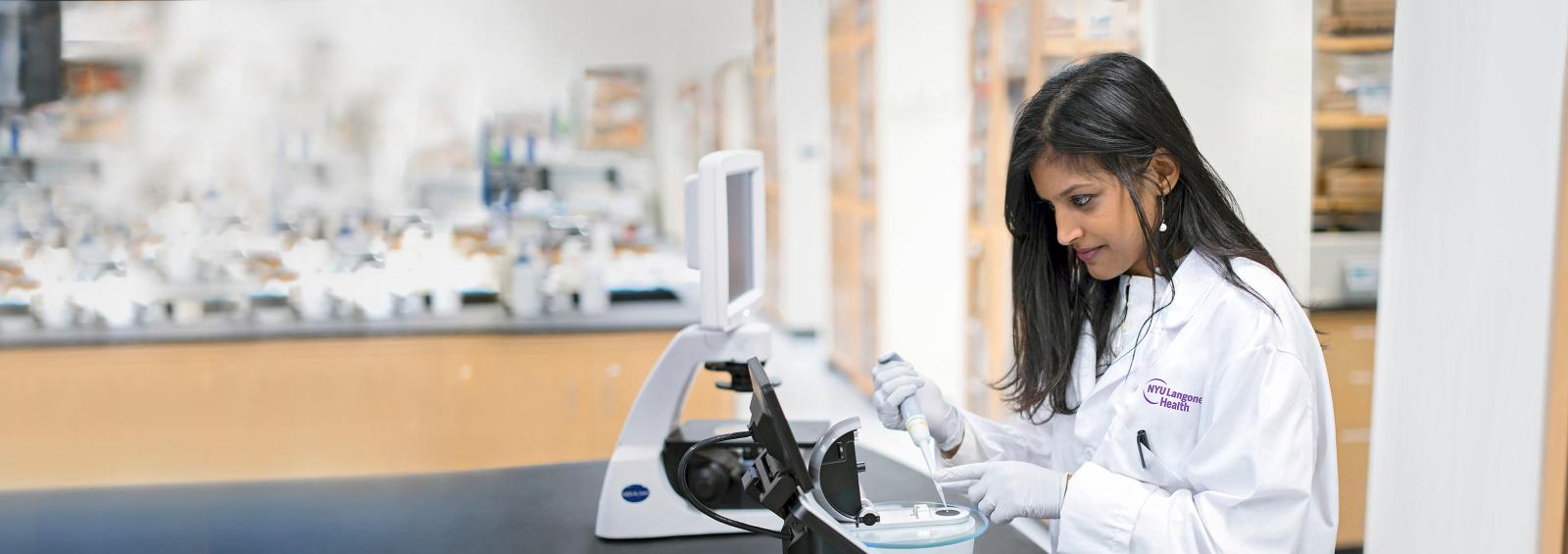Department of Surgery Research

NYU Langone’s Department of Surgery faculty are involved in diverse laboratory and clinical research projects in areas including injury control and prevention, pancreatic and other gastrointestinal cancers, pancreatitis, and vascular disease.
Charles J. DiMaggio, MPH, PhD
Charles J. DiMaggio, MPH, PhD, is director of injury research. Among his National Institutes of Health (NIH)– and Centers for Disease Control–funded work are the following:
- determining the optimal combination of harm reduction laws needed at the state and local level to reduce overdose rates and injection-related harms
- describing and analyzing the epidemiology of pediatric pedestrian injuries and the effectiveness of the national Safe Routes to School Program
- conducting surveillance to track and explain the behavioral health effects of the terrorist attacks of September 11, 2001, in New York
- investigating the developmental and behavioral effects of anesthesia on young children
Dr. DiMaggio has worked on a variety of public health–related issues, including bioterrorism preparedness, syndromic surveillance, and health disparities. He has an active and ongoing interest in the epidemiological application of Bayesian and spatial models to population health and large datasets. Learn more about Dr. DiMaggio’s work.
Bhama Ramkhelawon, PhD
Bhama Ramkhelawon, PhD, is principal investigator of the Ramkhelawon Lab.
Ramkhelawon Lab Research
The Ramkhelawon Lab’s research is focused at understanding the immunomodulatory mechanisms of vascular remodeling in two opposing settings: first in the context of aneurysm disease where the vasculature is faced with deadly degradation of the tissue; and second, in the study of how inflammation impacts vascular regeneration following occlusion of the femoral artery.
Aortic aneurysms develop silently yet are deadly. Upon rupture of the blood vessel, they have an unacceptably high mortality rate of up to 90 percent. They are responsible for approximately 15,000 deaths each year and approximately 2 percent of all deaths in men over 65 in the United States.
Because ruptured aortic aneurysms are life-threatening, it is critical to identify the molecular events that initiate and sustain the condition. Currently, surgery and stent grafting are the only available means to curbing aortic rupture and its complications.
Dr. Ramkhelawon’s lab is among the first vascular research groups to have applied next-generation sequencing technologies to the study of aneurysm disease development both in human biopsies and animal models established in her lab. For example, hers was the first group to profile the immuno-landscape of aneurysmal tissue using sophisticated single-cell RNA sequencing. Through this approach, her team has uncovered groundbreaking novel inflammatory mechanisms that sustain vascular injury during aneurysmal disease.
These include the following:
- The discovery that arterial macrophages maintain a pathological dialogue with vascular smooth muscle cells thereby sustaining arterial tissue degradation.
- Identification of the pathological circuitry connecting pulmonary disease (such as COPD) and increased prevalence of aneurysm development. Dr. Ramkhelawon’s lab characterized the role of macrophages in the aorta as key spatiotemporal entities capable of detecting remote signals stemming from injured lungs thereby directing disease outcome.
- Identification of the molecular determinants of intra-arterial mechano-sensation in disease progression. In this collaborative work, Dr. Ramkhelawon’s lab used sophisticated bioengineered devices to map microscale force alterations in the aortic wall at sites of aneurysm development.
Dr. Ramkhelawon’s efforts are geared toward finding a cure for aneurysm disease by escorting at least one of her findings into druggable target pipelines. She hopes to make an impact in the life of patients suffering from this deadly disease.
In addition, Dr. Ramkhelawon’s lab also studies how the inflammation guides the repair and regeneration of de novo blood vessels following stenosis of the femoral artery irrigating the leg. They have discovered novel inflammatory effector roles for platelets in this context.
Dr. Ramkhelawon has won several awards acknowledging her groundbreaking work in the field, including the Young Investigator awards from the American Heart Association and the North American Vascular Biology Organization. She is also a recipient of the L’OREAL–UNESCO for Women in Science International Award.
View Dr. Ramkhelawon’s NIH grants.
Research in Our Divisions
Learn more about research being conducted in our divisions:
- Division of Bariatric Surgery research
- Division of Colon and Rectal Surgery research
- Division of Endocrine Surgery research
- Division of General Surgery research
- Division of Pediatric Surgery research
- Division of Surgical Oncology research
- Division of Vascular and Endovascular Surgery research
Surgery Clinical Trials
Faculty throughout our department conduct clinical trials aimed at innovating new techniques and treatments for our patients. View current open trials at NYU Langone and search by investigator or condition.